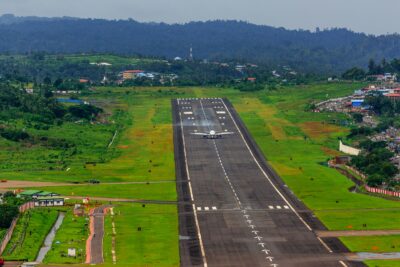Innovative Approaches to Streamline Airport Operations
Leveraging Artificial Intelligence in Airport Operations
Smart airport solutions are revolutionizing the aviation industry by integrating artificial intelligence (AI) to streamline operations and enhance the passenger experience. AI-driven technologies like predictive analytics and machine learning algorithms help manage passenger flow, optimize resource allocation, and improve security measures. For instance, AI can predict peak travel times and adjust staffing levels accordingly, ensuring a smooth and efficient operation. In Riyadh, airports have adopted AI to monitor real-time data, enhancing their ability to manage unexpected events and reduce delays.
The deployment of AI in airports extends to customer service as well. Intelligent chatbots provide travelers with instant assistance, addressing inquiries and guiding them through various procedures. In Dubai, these AI-powered assistants are equipped with multiple language capabilities, catering to the diverse passenger base. The integration of AI not only elevates operational efficiency but also significantly enhances the overall passenger experience, making air travel more seamless and enjoyable.
Moreover, AI-based facial recognition systems expedite the check-in and boarding processes. These systems reduce the need for physical documents and manual checks, allowing passengers to move through security checkpoints swiftly. This technology, already implemented in several airports across the UAE, including Dubai International Airport, exemplifies how smart airport solutions can transform the aviation sector by prioritizing speed, safety, and convenience.
Blockchain Technology: Enhancing Security and Transparency
Blockchain technology is another cornerstone of smart airport solutions, offering enhanced security and transparency in operations. This distributed ledger technology ensures that all transactions and data exchanges are secure and tamper-proof. Airports in Riyadh and Dubai are increasingly adopting blockchain to manage passenger identities, baggage tracking, and cargo handling.
One of the most significant benefits of blockchain in airport management is its ability to streamline the passenger verification process. By storing passenger information on a blockchain, airports can quickly and securely verify identities, reducing wait times and enhancing the travel experience. This approach not only improves efficiency but also ensures that personal data is protected from cyber threats.
In addition to passenger management, blockchain technology plays a crucial role in baggage handling. With blockchain, each piece of luggage is tagged with a unique identifier, allowing for real-time tracking throughout the journey. This reduces the risk of lost or mishandled baggage, providing passengers with peace of mind. Airports in the UAE are at the forefront of implementing these advanced systems, showcasing their commitment to leveraging modern technology for improved service delivery.
Furthermore, blockchain facilitates transparent and efficient cargo handling. By digitizing the entire supply chain, airports can ensure that all transactions are recorded accurately and can be audited easily. This transparency is particularly beneficial for customs procedures, where blockchain can expedite the clearance process by providing a verifiable record of all cargo movements. As smart airport solutions continue to evolve, the integration of blockchain will undoubtedly play a pivotal role in enhancing operational efficiency and security.
The Metaverse: A New Dimension in Passenger Experience
The advent of the metaverse is opening up new possibilities for enhancing the passenger experience in airports. This virtual reality environment allows passengers to explore airport facilities, access real-time information, and engage in immersive experiences from anywhere in the world. Airports in Riyadh and Dubai are experimenting with metaverse applications to offer travelers a unique and engaging journey.
One of the primary applications of the metaverse in airports is virtual tours. Passengers can use VR headsets or mobile apps to navigate through the airport, familiarize themselves with the layout, and locate amenities such as lounges, restaurants, and boarding gates. This virtual exploration can significantly reduce stress and improve the overall travel experience, especially for first-time visitors or those unfamiliar with the airport.
In addition to virtual tours, the metaverse enables airports to offer personalized services to passengers. Through AI-driven avatars, travelers can receive customized recommendations for dining, shopping, and entertainment options based on their preferences and past behaviors. This level of personalization enhances passenger satisfaction and encourages engagement with airport services, driving revenue growth for airport operators.
The metaverse also provides a platform for airports to conduct training and simulations for staff. By creating realistic virtual environments, airports can train employees on various scenarios, from emergency response to customer service interactions. This immersive training approach ensures that staff are well-prepared to handle real-world situations, ultimately contributing to a safer and more efficient airport operation.
Generative Artificial Intelligence: Redefining Customer Interaction
Generative artificial intelligence (AI) is transforming how airports interact with passengers, providing innovative solutions that enhance customer service and operational efficiency. Generative AI, which involves creating new content and responses based on existing data, is being utilized to develop advanced chatbots and virtual assistants in airports across Riyadh and Dubai.
These AI-powered virtual assistants are capable of understanding and responding to complex passenger inquiries, providing real-time information on flight schedules, gate changes, and airport facilities. By leveraging natural language processing and machine learning, these systems offer a more human-like interaction, ensuring that passengers receive accurate and helpful information promptly. This technology not only improves the passenger experience but also reduces the workload on airport staff, allowing them to focus on more critical tasks.
In addition to customer service, generative AI is being used to enhance security measures within airports. AI algorithms can analyze vast amounts of data from surveillance cameras, identifying suspicious activities and potential security threats in real-time. This proactive approach to security ensures that airports can respond swiftly to any incidents, maintaining a safe environment for passengers and staff alike.
Moreover, generative AI is aiding in the development of predictive maintenance systems for airport infrastructure. By analyzing historical data and identifying patterns, AI can predict when equipment or systems are likely to fail, allowing for timely maintenance and reducing downtime. This not only ensures the smooth operation of airport facilities but also minimizes disruptions to passenger services.
Modern Technology: Driving Business Success in the Aviation Industry
The integration of modern technology in airports is a critical factor driving business success in the aviation industry. By adopting smart airport solutions, airports in Riyadh and Dubai are setting new standards for operational efficiency, customer satisfaction, and revenue growth. These advancements are not only enhancing the travel experience for passengers but also providing significant benefits for airport operators and stakeholders.
One of the key benefits of smart airport solutions is the ability to optimize resource allocation. By leveraging technologies such as AI, blockchain, and the metaverse, airports can manage their resources more effectively, reducing costs and improving efficiency. This optimized resource management translates into better service delivery, shorter wait times, and increased passenger throughput, all of which contribute to higher revenue generation.
In addition to operational efficiency, modern technology enables airports to offer a more personalized and engaging travel experience. By utilizing AI and the metaverse, airports can provide tailored services and experiences that cater to individual passenger preferences. This level of personalization not only enhances customer satisfaction but also fosters loyalty, encouraging repeat travel and positive word-of-mouth.
Furthermore, the adoption of smart airport solutions positions airports as leaders in innovation and technology. This forward-thinking approach attracts investment, partnerships, and business opportunities, driving economic growth and development. By staying at the forefront of technological advancements, airports in Riyadh and Dubai are not only improving their operations but also contributing to the broader economic success of their regions.
Leadership and Management Skills: Essential for Implementing Smart Airport Solutions
The successful implementation of smart airport solutions requires strong leadership and effective management skills. Airport executives and managers in Riyadh and Dubai play a crucial role in driving technological innovation and ensuring that these advanced systems are integrated seamlessly into airport operations.
One of the primary responsibilities of airport leaders is to foster a culture of innovation and continuous improvement. By encouraging staff to embrace new technologies and providing opportunities for training and development, leaders can ensure that their teams are well-equipped to handle the demands of a smart airport environment. This commitment to innovation is essential for maintaining a competitive edge and delivering exceptional service to passengers.
Effective project management is also critical for the successful deployment of smart airport solutions. Airport managers must oversee the planning, execution, and monitoring of technology projects, ensuring that they are completed on time and within budget. This involves coordinating with various stakeholders, managing resources, and addressing any challenges that arise during the implementation process. Strong project management skills are essential for navigating the complexities of integrating new technologies into airport operations.
In addition to technical expertise, airport leaders must possess strong interpersonal and communication skills. By building positive relationships with staff, stakeholders, and passengers, leaders can create a collaborative and supportive environment that fosters innovation and success. Effective communication is also crucial for ensuring that all parties are aligned with the airport’s strategic goals and understand the benefits of smart airport solutions.
#SmartAirport #AirportInnovation #AviationTechnology #AIinAirports #BlockchainSecurity #MetaverseExperience #GenerativeAI #ModernAirport #LeadershipSkills #ManagementSkills #FutureofTravel























